Thomas E. Ricks's Blog, page 191
March 30, 2012
Blogging Thucydides (II): Pericles' funeral oration & the Gettysburg Address
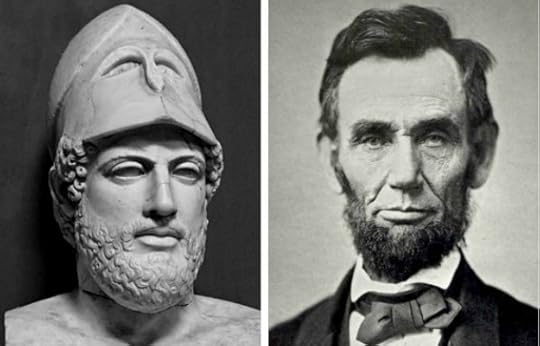
It seems to me, reading Pericles' funeral oration (431 BC),
that it clearly provided the inspiration for Abraham Lincoln's Gettysburg
Address.
Pericles begins by dismissing his own speechmaking ability:
"[I]t is hard to speak properly upon a subject where it is even difficult to
convince your hearers that you are speaking the truth." That reminded me of
Lincoln's "The world will little note, nor long remember what we say here."
Pericles
then dwells on what we might call "Athenian exceptionalism": "Our constitution
does not copy the laws of neighboring states; we are rather a pattern to others
than imitators ourselves." A bit later, he adds, "In short, I would say that as
a city we are the school of Hellas." This brought to mind Lincoln's beginning,
"Four score and seven years ago our fathers brought forth, on
this continent, a new nation, conceived in Liberty, and dedicated to the proposition that
all men are created equal. Now we are engaged in a great civil war, testing
whether that nation, or any nation so conceived and so dedicated, can long
endure."
Most striking of all, both speeches
conclude by challenging the living to live up to the standard set by the
fallen. "So dies these men as became Athenians," says Pericles. "You, their
survivors, must determine to have as unaltering a resolution in the field." I
think Lincoln expresses that thought better: "It is for us the living,
rather, to be dedicated here to the unfinished work which they who fought here
have thus far so nobly advanced. It is rather for us to be here dedicated to
the great task remaining before us -- that from these honored dead we take
increased devotion to that cause for which they here gave the last full measure
of devotion -- that we here highly resolve that these dead shall not have died in
vain -- that this nation, under God, shall have a new birth of freedom -- and that
government of the people, by the people, for the people, shall not perish from
the earth."
(After writing this I did some quick
Googling and saw that the comparison between the two speeches is apparently a
major theme of Garry Wills' book
on the Gettysburg Address. So clearly I am not the first to come across this.)
I knew that Lincoln was into Shakespeare and the King James Bible, but I hadn't
realized he also absorbed the Greeks.
The day in 1965 when I mistakenly gave a ride in my boat to a bunch of Viet Cong

By Ron Rogers
Best Defense department of
odd war stories
I forgot to mention a unique story about an experience enjoyed by
no other soldier in Republic of Vietnam (RVN). There came a day when I gave a nice Viet Cong (VC) platoon a ride
down the canal separating RVN from Cambodia and they asked to be dropped off on
the VC side and disappeared into the high grass as they walked to their R&R
leave, 1 kilometer away in Cambodia. They were so grateful for the ride that they didn't
shoot me!
When the platoon leader waved me down, I thought that I was giving
a Popular Force platoon a ride. As I continued down the canal to my temporary
duty at A-424,
it dawned on me that they had gotten off on the wrong side! I pushed the
throttle as far as it would go and raced along close to the bank so the VC
would have a harder time tracking me with a weapon. Their nice platoon leader
wore an NVA pith helmet without the star and he spoke French with me. I think
they would have ridden further, but their crisp khaki uniforms were getting wet
and the men got upset. Their leader wore shorts and high socks and didn't care,
but he didn't want their uniforms messed-up or their AKs (very few of the South Vietnamese Popular Force had that
weapon!) to get rusty. They didn't try to take the 2 M1s lying in the bottom of
the boat. They belonged to the two VN SF assholes who ignored my orders to get
underway and went to eat and take Pak. The chain didn't know what to say to me
and I told them I didn't appreciate being fucked with. We had a schedule and
they were violating it. Boy, were they pissed when they were handed back their
rusted rifles.
We radioed around when my commander thought it was weird to find a
wandering PF unit wanting to cross the canal. Well, there were no PF in that
sector that day -- just me and a VC platoon. I held that throttle so hard that
the web of my thumb was bleeding badly. So I stopped at a fort and a Vietnamese
medic bandaged it and spoke French with me. (Can you get a Purple Heart for a
self-inflicted wound?) They thought that I was French! In 1965, a decent number
of rural folks thought that we beret wearers were French. I guess they hadn't
read the papers nor watched TV.
Sometimes you can get scared without being shot at. Of course,
that platoon commander was awfully nice.
Ron Rogers was a Special Forces soldier once, and young.
Rebecca's War Dog of the Week: RIP MWDs Rony, Lex, Nisan, Bino, and Bastar
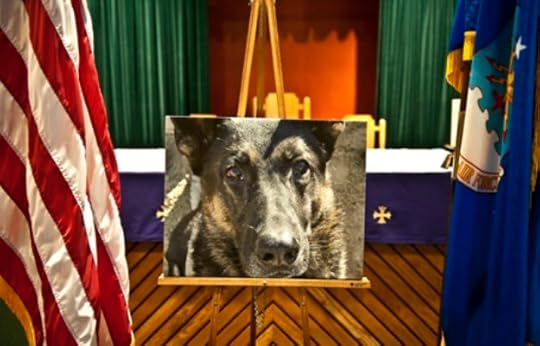
By Rebecca Frankel
Best Defense Chief Canine Correspondent
There's been a lot of exciting war-dog news this month --
Sgt. Rex's adoption moving forward, for one -- but as March comes to a close,
not all recent tidings have been so cheery. No fewer than five military working dogs passed away this month (I sincerely hope that aren't any others to add to
this list). Each served valiantly in his own way, whether down range or during retirement,
and so it feels only right to pay tribute not just to one lost war dog, but to
all of them. This week's post may be a lengthy one though the space has certainly
been earned.
Rony:
On March 16, a large crowd gathered in the chapel at Hurlburt
Field AFB in Florida to pay respects to MWD
Rony who, according to Master Sgt. James Miller, was not just your average dog or average
military working dog. [And one who] will never be forgotten."
Rony's illustrious seven-year career began in 2004 when he
was two years old. After pairing up with Staff Sgt. Robert Calhoun in 2009, the
two provided "force
protection at Hurlburt Field to countless combat foot patrols and air assault
missions in Iraq and Afghanistan. [Rony's] last tour to Kandahar, Afghanistan,
included more than 1,000 hours outside the wire."
Calhoun says his partner, who succumbed to "cancer and
internal bleeding" earlier this month, was so good at his job that he was a
"top-demand asset" on their missions in Afghanistan. When they were hit with
enemy fire, Rony held ground alongside him and together they received a bronze
star. "Rony saved
my life when we went into an abandoned compound, and he found a 155-round before
I stepped on the pressure plate ... He's the reason -- he brought us home."
Calhoun delivered an eloquent eulogy on behalf of his
beloved canine partner, describing the vet visit that unexpectedly brought the
pair to their final moments together.
I had the honor of
standing by his side, holding his paw, softly sighing as his heart stopped
beating ... I'll always cherish the moments we had together and know for a
moment in time we were untouchable. I'd say this to Rony, F547: Thank you for
your commitment, loyalty and trust. You will always be in my heart, and I will
always love you. Rest in peace, my little warrior."
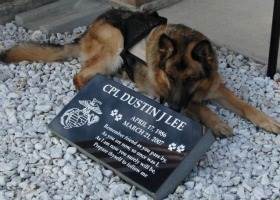
Lex
In December 2010 we wrote about Lex,
the first MWD to be adopted by the family of his fallen handler, 20-year-old
Cpl. Dustin Lee. It was just five years ago in March 2007 when Cpl. Lee was
fatally wounded in Iraq after
a "73 mm" rocket attack. Lex who was hit with shrapnel spray, was also
seriously wounded, but he did not leave Lee's side until their fellow Marines
got to them.
The Lee family was unrelenting in their campaign to bring
Lex home and in the years since, in their resolve to rehabilitate the
new family member -- Lex's wounds (50 shrapnel pieces lodged in his body), the
resulting surgeries, and therapy were extensive -- as was their drive to bring
Dustin and Lex's story to those who might benefit most. When Lex wasn't
receiving hydro-therapy, he was on the road visiting veterans and inspiring the
local community in his new home state of Mississippi. One such Lex loyalist is
sixth grader, Bentley Burns who not only made him the subject of her American
Military Hero school project, but wrote a story
about him for a local paper, The Byram
Banner, in which she refers to Lex as "an awesome dog."
Lex died just last week, succumbing
finally to an "aggressive cancer." It's a tremendous loss for the family as
well as the community they've built around Lex. As Lee's mother, Rachel, told
reporters this week, "Besides the obvious of being
able to touch something Dustin touched, it goes beyond."
Photo: Angels for Lex
[[BREAK]]
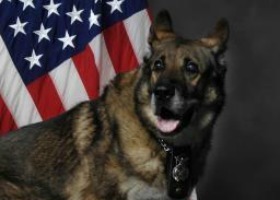
Last week fellow servicemen and women of Wright-Patterson
AFB in Ohio held a memorial service for Nisan, a German shepherd, who'd been
stationed there since the beginning of his MWD career. According to reports,
Nisan was euthanized in early March because of "old age and
ailments."
Nisan was a dual-purpose dog, which means he was a patrol
dog who was also trained to find narcotics. During his eight-year career he
uncovered more than "nine kilograms of narcotics, resulting in at
least 500 arrests" and, in 2009, deployed to Iraq.
The tribute included "a bugler playing
"Taps," a bagpiper playing "Amazing Grace" and the firing of a 21-gun salute."
Nisan's most recent handler, Staff Sgt. Seth Dale, also spoke.
"He was my
partner, and my protector, and my family," Dale said. "[Nisan] was also very
intuitive in his nature. If I was having less than a favorable day or week, and
was a little down, he would let me know he was there for me."
Photo: From Nisan's AFB
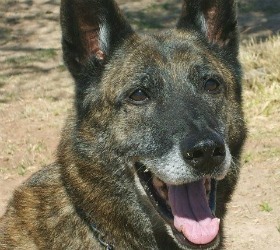
Bino & Bastar
Fourteen-year-old Bino was a Dutch shepherd who served in
Iraq and on the U.S.-Mexico border. A patrol and detection dog, he spent the
majority of his career working out of Fort Gordon, Georgia, but the end of his
life was devoted to helping "wounded Soldiers at Ft.
Bliss learn to navigate stores, elevators and other busy locations."
And while I couldn't find any reported news of this anywhere in
media, the family that adopted MWD Bastar, a retired MWD, posted news of his
death this month on Facebook. He was 16 years old.
Photo: Facebook
Rebecca Frankel, on leave from her FP desk, is
currently working on a book about military working dogs to be published by Free
Press.
March 29, 2012
Blogging Thucydides (I): I don't get it
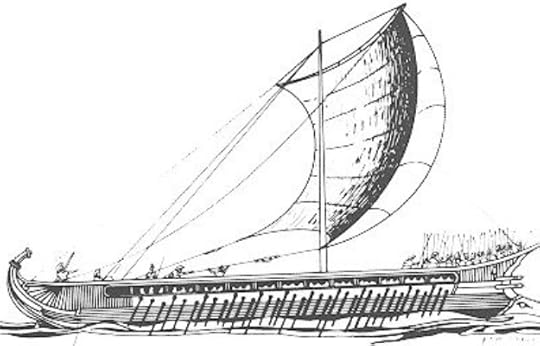
I'm going to England for a bit, so am starting this series
and will run it for a few days until I see if they have the internet there. I
also will find out of they all talk like Monty Python people.
I've tried, but I just don't get Thucydides' The Peloponnesian War. I'm not proud of
the fact. And yes, I know this is all my own fault, just the same as my not
much liking John Coltrane or Charlie Parker. (I once got a note from a Marine
in southern Afghanistan instructing me which Coltrane CD to start with -- the
title of the disc was something like
"Coltrane's Ballads." I tried. But entry-level Coltrane playing gently just
sounded to me like a minor league Ben Webster. Nobody plays ballads like
Webster.)
Back to Thucydides. Lots of smart people have told me it is
essential reading, so I figured I would give it another whack. So I am here to
report that I have finished reading through Thucydides for the second time.
Alas, no better this time. When I read and re-read
Clausewitz, which I have done often, lines jump out at me on every page. Not here.
I know this is taught as the world war of 400 or so BC, but it just feels to me
like a lot of village squabbles. (I did enjoy the section on the Sicilian expedition,
but I suspect that is mainly because I love Sicily, and especially the old city
in Syracuse, and have climbed all over the walls above the city. I've even
eaten lunch twice at the spot where the Athenians first fought the Syracusans,
on the riverbank about a mile west of town where there is now a World War II
Italian pillbox. Mock the Italian army if you will, but their pillboxes were
built to last.)
That said, there were a few things that intrigued me, and I
will mention them in subsequent posts. Maybe there is hope for me yet.
A few more words in defense of Big Mac
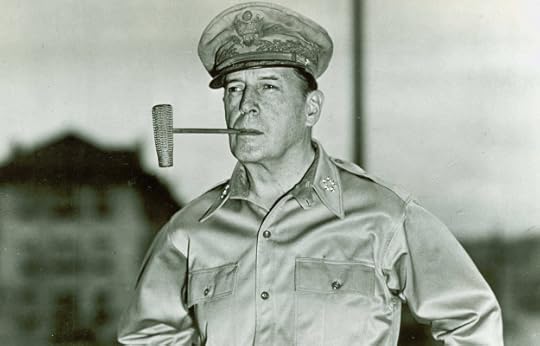
By John M. McFarland
Best Defense guest columnist
Your opinion on MacArthur
as the
worst general in U.S. history absolutely baffles me. It just
reinforces the notion that anyone, anytime, can assert some completely
uninformed, ridiculous opinion on an internet blog and get away with it. Place a Washington Post byline
beneath their name, and, suddenly, they have some type of credibility, or
presumed knowledge or insight about anything.
One actually has to study military history to be able to articulate an
opinion such as that which you have so carelessly issued. Either you have
never studied it, or you were skipping that instruction when it was offered to
you. If MacArthur
had never set foot in WWII or Korea, he still would have been one of the
greatest battlefield leaders in American military history, based solely upon
his performance in WWI. If you want some suggested readings to inform
yourself about MacArthur's military career, and about more basic military
affairs or matters generally, I will be happy to provide them. It's
never too late to
learn.
One can read everything
about MacArthur 5 times over, but fail to ever gain the slightest insight
into him if (i) one reads everything about MacArthur with a view and
goal of extracting only what fits into the preconceived notion of MacArthur to
which one is already wed, and/or (ii) one is more concerned with articulating
opinions or judgments that will be more readily accepted by those of one's
particular social/political persuasion or perspective, rather than viewing a
historical figure fully in the round. It's not necessarily what you
read, but how you read it.
Now you want to strip him of his
WWI accomplishments. I am familiar with the
book to which you refer. That author looked at the historical record
(as he perceived it) and pronounced most proudly that he had discovered that
MacArthur had not actually set foot on the objective in the battle campaign
for which he received a DSC (one of 4, I believe, that
MacArthur received from a headquarters that was hostile to him). Because of this author's "extensive" knowledge of all things
military, he concluded from this sole "fact" that MacArthur did
not deserve his decoration, had not performed with valor worthy of
the citation, and was a charlatan and a fraud. This author
supposedly discerned 80+ years after the fact what no one in the Rainbow
Division, Chaumont, or the AEF discerned during the attack. The
sheer tonnage of what that author obviously does not know about military operations on
a tactical level literally took my breath away. As William Manchester
remarked in American
Caesar, there is almost nothing
derogatory that can be said about MacArthur these days that will not be
believed immediately at face value by those untrained or unwilling to examine
the premises of the statement.
All of the great captains of history have manifested flaws roughly commensurate with their
brilliance. MacArthur is no different than, for example, Napoleon or
Hannibal in this regard. The best single volume analysis of
MacArthur, I believe, is Geoffrey Perret's Old
Soldiers Never Die -- The Life of Douglas MacArthur. Perret
is critical and judgmental of MacArthur when necessary and appropriate, but
succeeds as a military historian in viewing MacArthur in the round, which you,
in this regard, clearly do not. Perret judged MacArthur the second
greatest soldier in American history, after U.S. Grant. Perret expressly
moves him to second place because of MacArthur's dabbling in politics late in
his career, and his antagonism with President Truman. Unlike
you, however, Perret does not allow himself to be blinded by these
episodes in analyzing MacArthur's place among the great captains of
history, and certainly American military history. While I disagree with
that particular conclusion of Perret, I respect his process because he has
viewed and analyzed the complete sum of MacArthur's life in the whole, not little snippets of his life that are cherry-picked by authors such as you
to support the preconceived end that they have already identified for
their analysis.
Where have you possibly gone or
whom have you possibly talked to in order to draw the conclusion that
the U.S. Army has "extirpated" the memory of Douglas
MacArthur?
John M. McFarland,
an attorney and graduate of West Point, served in the 82d Airborne Division and
5th Special Forces Group before attending law school on active duty
and transferring to the Judge Advocate General's Corps, where he continued
his service before leaving the Army to begin private practice.
March 28, 2012
Annals of C2 (VI): Here's why coalition command structures are so ungainly

By Nora Bensahel
Best Defense bureau of C3 (command, control and confusion)
Awhile back, Tom asked why
the United States is so bad at designing effective wartime command structures. Subsequent contributors and commentators
identified several different reasons, including careerism, bureaucratic
turf wars, and an imbalance in civil-military relations. Yet most of these comments have overlooked
one critical factor: The United States almost always fights its wars in
coalition with other countries, and coalition
command structures never work well.
Political cohesion is the center of gravity in any coalition
operation. Even when all coalition
members agree on the desired endstate of the operation, they often disagree
about how to achieve those objectives
-- and particularly about command and control structures. They must compromise to find some sort of
agreement that they all find acceptable. Unsurprisingly, the political imperatives of consensus and agreement
often conflict with the military imperatives of winning a war as quickly and
cheaply as possible. And when they conflict, political cohesion usually wins.
Examples abound of wartime command and control structures
that were considered ineffective from a purely military perspective. In 1999, for example, many observers decried
NATO operations in Kosovo as a "war by committee," since any member state could
veto any target on the air strike list. (The Dutch took a lot of flak for vetoing a strike on a palace where a
Rembrandt painting hung, but the United States vetoed targets more
frequently because of its stringent standards about potential civilian
casualties.)
The command structure in Kosovo may have not have been
particularly efficient, but it did not prevent the war from reaching a
successful outcome. In Afghanistan, however, the need to maintain coalition
cohesion has led NATO to accept force contingents from many countries that
place national caveats -- or restrictions -- on how those forces may be used,
which has significantly limited the military options available to the NATO
commander. National caveats have already
been blamed for many of the military shortcomings of the operation, and they
will be blamed even more if the ultimate outcome of the operation is judged to
be a failure.
Even coalition command structures that seem to work well
often do so despite being inefficient
and politically driven. Capt. Rosemary
Mariner (U.S. Navy, ret.), for example, argues that "command and control in
the [1991] Gulf War was a big success story." Yet to assuage Saudi political concerns, the operation involved two
entirely separate chains of command -- one under the command of U.S. General
Norman Schwarzkopf, which included most Western forces, and the other under the
command of Saudi General Khalid bin Sultan, which included all Arab
forces. Neither general had the
authority to issue orders to the other, which clearly violates the principle of
unity of command, though they coordinated informally very well.
Furthermore, some crucial operational decisions were made
for political rather than military reasons. At the beginning of the air war, General Schwarzkopf diverted more than
one-third of the coalition's 2000 daily air sorties to hunt for Iraqi Scud missiles
that were being fired on Israel, which put the air war significantly behind
schedule. Even though he repeatedly told
the press that the Scuds were militarily insignificant and posed no threat to
the coalition, this was the price that had to be paid to keep the Israelis from
retaliating directly. At the end of the
war, U.S. Marines waited outside Kuwait City for more than 24 hours --
one-quarter of the entire length of the ground campaign -- for Arab forces to
catch up so they could symbolically liberate the Kuwaiti capital.
Why didn't these military inefficiencies pose more of a
problem? Simply put, the Gulf War
coalition possessed a lot of slack that could absorb these inefficiencies. The Iraqi military turned out to be much
weaker than originally anticipated, and could not mount a coherent military
response to the coalition offensive. Furthermore, the coalition had more than six months to execute its operational plans almost exactly as they
were written. Saddam Hussein's
shortcomings mean that these coalition arrangements were never tested under any
operational stress at all. Similar
command arrangements could easily become problematic in more challenging
military situations.
Clausewitz's famous dictum applies as much to military
coalitions as it does to individual states.
Coalition warfare is still the continuation of politics by
other means -- but politics in the international system requires bargaining and
compromise among sovereign states. And
that results in wartime command structures that do not operate efficiently or,
in some cases, effectively.
Nora Bensahel is the deputy director of
Studies and a senior fellow at
the Center for a New American Security. Her Ph.D. dissertation was titled "The Coalition Paradox: The Politics
of Military Cooperation."
Former regime element joins Obama team

Brett
McGurk, who I ran into in the Green Zone when he was negotiating the SOFA
with the government of Iraq, has been named
U.S. ambassador to Iraq. This is good because he knows all the promises
Maliki has made over the years, not just to the U.S. but to Kurds and others,
and so might be able to better forestall the prime minister's various attempts
to re-negotiate all his deals.
No
word on whether he had to take an oath renouncing all support for the Bush administration.
Comment of the day: The comments czarina speaks to the unhappy campers

I take as my
text today Isaiah 19:9's crack about IT departments: "they that weave
networks shall be confounded."
I have decided
to leave the country until the comments mess is sorted out. Meantime, here is
an explanation
from Cara Parks, czarina
of the Foreign Policy comments
department:
Hello BD commenters! I can see here that there are some concerns about the new commenting system, so I wanted to jump in and add a few comments myself.
First, I want to emphasize that you DO NOT have to sign into Facebook, Twitter, or any other social network, in order to comment. While we wanted to emphasize the option of using those accounts to our readers who already have them, doing so is not mandatory.
Here's how you can create an anonymous commenting account through the new system: Click on the LiveFyre logo below the gray box of text in any post created from Tuesday, March 27 onward. A pop-up screen will appear; click on "LiveFyre" on the left hand side of that screen. The system will prompt you to create a new account if you do not have one -- put in any user ID you'd like, and any email address that works for you. You will then be able to comment as normal on the site.
This account login is encrypted to protect your identity, making it even more secure than the FP login (one of our reasons for changing the system). LiveFyre asks only for your email account and a login ID, which can be whatever you choose in order to protect your anonymity. Adding your actual name to a LiveFyre account is optional.
While there is an option to post your comments to Facebook or Twitter, you do not have to do so. The default setting will not post your comments anywhere but on this site.
We at FP really appreciate the input that our commenting community provides, and are attempting to make commenting easier. We are trying to cut back on the spam and inappropriate comments that have been able to infiltrate our site, not to alienate valued readers such as the ones on this blog. We really want to keep your insights coming, which is why we left all existing comments on the site intact. Please ask me any questions or share any concerns you still have here, and I will do the best I can to answer.
TR: Clearly, she
comes in peace. In a note to me, she
adds:
There's no need to sign in using Facebook if he wants that information to remain private. If he creates a LiveFyre account, it will be completely anonymous -- just like the old Foreign Policy login. Does that help?
TR:
I see a ray of light on yonder horizon. RVN SF VET, one of the skeptics, filed
this report:
It works! And this time it didn't try to invade my privacy. Has anyone else noticed that the new system no longer offers to correct your spelling when you right-click on a misspelled word. I think that it is a missing link to the Word spell checker on my PC.
TR:
If you have a big problem, please post about it or e-mail me, and I will
forward to Cara and her team of hard-working IT dweebs.
March 27, 2012
Soldiers' suicides: Some counterintuive conclusions from a former Army clinician
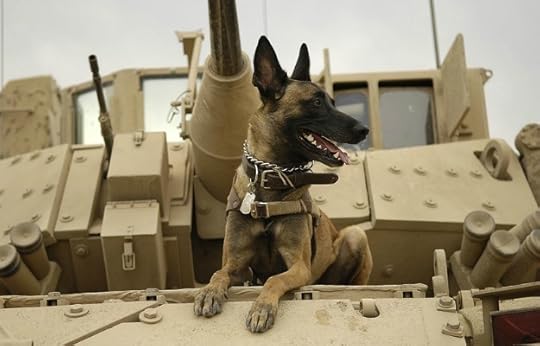
Retired
Army Col. Elspeth Ritchie has a good overview of
Army suicides in Cerebrum, an
online neuroscience magazine.
Among
the things I didn't know:
--Researchers
tend to believe that suicides are under-reported in the Army Reserve. (Is life always worse in the Reserves?)
--It
isn't the soldiers with major injuries who kill themselves. "Perhaps
counterintuitively, suicides among those who have major injuries are rare; more
often a minor injury or backache contributes to depressive symptoms, a belief
that one cannot 'be the soldier I used to be,' and irritability."
--The
decision to commit suicide may be more a matter of what a unit has been doing
than what an individual soldier has experienced. "Drawing my conclusions from
ASER data and many other sources, I will argue that it is the unit's deployment
history, rather than the individual's deployment history, that contributes the
most to suicide risk."
--Access to weapons is a problem -- but the Army
doesn't like to talk about that. "After reviewing hundreds of suicide cases, I
am convinced that the easy availability of weapons is a major part of the
problem. According to the Army's database, about 70 percent of Army suicides
are committed with a firearm. In the theater of war, guns are
normally the government-issued weapon. Stateside, a gun is usually the
privately owned weapon. The gun in the nightstand is too easy to pull out and
use when a person is angry or humiliated or fighting with a spouse. Yet
discussion of access to weapons is the third rail in the military -- it is not
often brought up in formal mitigation strategies. The Army Task Force did not
address access to weapons at all. The DoD Task Force does mention means
restriction. "
--As
readers of this blog know, dogs help. "Wounded soldiers find that the presence
of their service animal decreases their PTSD symptoms and their feelings of
anger and fear. Veterans who would not leave the house will bond with their
dogs, walk them, and regain structure in their lives."
Today's follow-up: Former Army vice chief of staff says there was no pressure from Rumsfeld's goons to retire Taguba
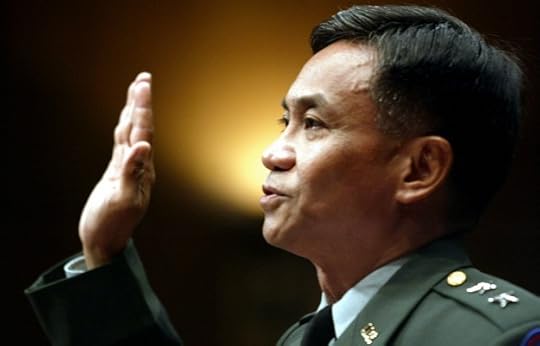
I caught up with
retired Gen. Richard Cody on Monday morning and asked him if Douglas Feith or
another Rumsfeld follower had pressured the Army to retire Maj.
Gen. Tony Taguba after Taguba filed his report on abuses and torture at the
Abu Ghraib prison.
Absolutely not,
Cody said. "The reason Tony didn't go any farther, and retired as a two-star
general, was that it was his time," he said. Despite Taguba's suspicions, there
was no pressure from the Rumsfeld crowd, he added. (This rings true to me -- I
once attended a lecture for new Army generals that informed them that all their
careers would end with a phone call telling them it was their time to
retire.)
As for the
Taguba report itself, Cody added, "Tony did a pretty damn good job, I thought.
I was proud of him. . . He spoke truth to power."
Thomas E. Ricks's Blog
- Thomas E. Ricks's profile
- 436 followers



